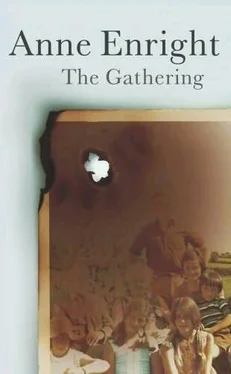Quite brazen.
He might hate her now, though Nugent is too young, at twenty-three, to put a name on the emotion that sweeps through him and is gone, pulling in its wake a change of air. Something open. A zephyr. What is it?
Desire.
At thirteen minutes past seven desire breathes on the young lips of Lamb Nugent-hush! He feels its awful proximity. The need to move surges through him, but he does not move. He stands his ground while, across the room, Ada’s stillness becomes triumphant. If he is very patient, she might look at him, now. If he is very humble, she might state her terms.
Or maybe she won’t. Nothing has been said. No one has moved. It is possible that Nugent is imagining it all-or that I am. Maybe he is a pathetic thing at twenty-three; all hand-wrung tweed cap and Adam’s apple; maybe Ada doesn’t even notice him there across the room.
But this is 1925. A man. A woman. She must know what lies ahead of them now. She knows because she is beautiful. She knows because of all the things that have happened since. She knows because she is my Granny, and when she put her hand on my cheek I felt the nearness of death and was comforted by it. There is nothing as tentative as an old woman’s touch; as loving or as horrible.
Ada was a fantastic woman. I have no other word for her. For the set of her shoulders and the way she trotted off down the street, with her shopping bag flapping at her hip. Her hands were never empty, and you never saw what was in them; whatever was to be folded or washed or moved or wiped. You never noticed her eating either, because she was always listening to you, or talking; the food just disappeared; like it didn’t actually go into a hole in her face. Her manners were perfect, in other words, and contagious. Even when I was eight years old, I knew she had charm.
But how did Nugent know it, before she ever opened her mouth to speak to him? I can only suppose that it did not matter, that there were phases and stages to his attachment (he hated her, after all, before a quarter past seven), each of which he must re-enact in longer cycles-years long, or decades-he must move from love to a kind of sneering, he must be smitten by hatred and touched by desire, he must find a final humility and so begin with love again. Each time around he would know more about her-more about himself perhaps-and nothing he learned would make any difference. By fourteen minutes past seven, they are back just where they began.
But what of love?
Nugent does move now, quite suddenly. He ducks his forehead down and rubs his hairline at the roots. Is it possible that she might love him too? That they return to the moment when she walked in the door, and rise above these petty concerns of exchange and loss?
Ah yes, says the side of Ada’s sad face. And she thinks about love for a while.
Nugent feels it stir in the deep root of his penis; the future, or the beginning of the future. No one interrupts them, now. Someone has strangled the maid in an upstairs room; the puppet concierge is thrown on a chair. There are fourteen feet of carpet between them. Nugent thinks of the swell of his glans easing out from its sack of skin and Ada thinks about love, while the hotel clock slips, and softly grinds, and whirrs into the quarter-hour chimes.
Dee dee de dee dah!
Dah dah de dee dah!
Revived, summoned, the little concierge trots into the gloom of the foyer with a small footstool which he places under a lamp on the wall. He trots out again and comes back with a spill held aloft, its flame made dingy by the last light of day. He stands on the stool to remove the shade, turns on the jet, fumbles the spill and, before it is altogether too late, manages the flame to the gas. It hisses hollow and blue before settling into the yellow-green glow of the mantle, and the light dips and then bounces out into the room. The foyer is sick with the smell of gas, followed by the warm smell of burnt paper, as black flakes scatter from the man’s quick fluttering fingers. He replaces the shade, moves the stool under the next lamp, and leaves.
In his absence, the room pulses darker. And darker again.
He returns. Nugent and Ada both look at him as he completes the ritual of the lamp and stool; his entrances and exits; his ghastly self-importance as he moves around the walls towards the fourth and final lamp, which is above the chair in which Ada sits. He sets the stool beside her feet, as though bowing, and eases himself away again. After a long moment he comes back with the flame he might, but did not, take from the fire burning in the grate. He didn’t want to bend over in front of them, perhaps, though he has no compunction about making Ada stand. He pauses before her, dipping the spill one way and another, saving and coaxing the flame back along the paper. He looks to her face. And waits.
Ada’s dress rustles loose from her lap as she rises to her feet. And it may as well have fallen altogether on the floor; the dress might have been made of water, it might have been a puddle of colour around her feet, so naked does she look now. Nugent stares quite frankly while she clasps her hands in front of her, and looks down. At first he pities her, and then he does not. He shifts at last, at the side of the desk, and takes comfort from the smell that escapes in a sigh from under his shirt. Thank God for that. It is not his fault.
He was at the Pro-Cathedral that morning, for early Mass. He walked in a line with other men for Holy Communion. The look on their faces was as hungry as poor men queuing for soup. And when he got up from his knees, he did so like a decent man: slow in the haunches, heavy with the weight of his life on this earth, sad for the people he loved. Brave.
It is Lent. Nugent has given up rashers, sausages and all kinds of offal for the duration, also strong drink. His body has been cleansed by the workings of his soul-so the smell that rises from under his shirt has something of the spring air in it, a whiff of early morning soap, the quiet ming of a day’s toil. The cloth of his suit is decently worn and the collar of his shirt is decently clean, and his life stretches ahead of him decently waxing into a solid middle age.
With one small interruption-because there is nothing decent about the glint in his baby eye, looking at Ada Merriman in the foyer of the Belvedere Hotel.
She has looked back at him. Standing-as it were, naked-with her hands clasped in front of her, she has lifted her face and looked him in the eye.
This is the shock. The shock is the complete self of Ada Merriman. Her pupils widen to receive him; they rush open, and Nugent is glad of the support, beside him, of the desk’s wooden wall.
Then they smile. Ada smiles. Like there is some joke in the room, that she wants him to share.
Nugent looks at her. He wonders which part of her body she finds so amusing. Is it her breasts, or her throat? Either she does not realise she is naked (she is, after all, fully dressed), or else she does not care. She may be laughing at the little man who is lighting the lamps. Or she may be laughing at him-standing there like a gobdaw with a lump in his pants. And Nugent’s eyes swell with the unfairness of it, and with the force of love denied.
Except-as the little lamplighter might tell him-she has not denied him anything yet. She has not denied him, at all.
The gas lights burble and faintly hiss as the stool is lifted and the man withdraws, angled slightly towards these lovers in cynical courtesy, as if he can see it all, the coupling (such squelchings), the money, the lies that they have already begun to tell. Oh, if it was a song you could sing it. If it was a song you could batter it out on the spoons. Especially in Dublin, in 1925.
This is all my romance, of course. Everyone had a beautiful grandmother-something to do with sepia and the orange blossom in their hair. Also the steady look in those old-fashioned eyes. We do not know how to be brave, any more, as a bride was brave in those days. Here is Ada’s wedding picture: she wears the low veil of the 1920s and the silk of her dress shows its tender, hand-sewn stitches in a line of dents around the hem. She was pure and she burned. Ada Merriman, my modest, ardent grandmother, was the thing poets wrote about, in 1925.
Читать дальше












